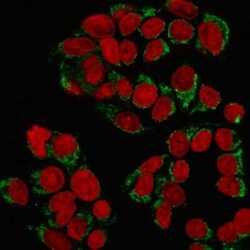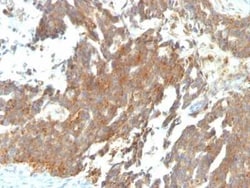Promotional price valid on web orders only. Your contract pricing may differ. Interested in signing up for a dedicated account number?
Learn More
Learn More
GnRHR Antibody (GNRHR/768), Novus Biologicals™


Mouse Monoclonal Antibody
Supplier: Novus Biologicals NBP2453000.1MG
Description
Ensure accurate, reproducible results in Flow Cytometry, Immunohistochemistry (Paraffin), Immunofluorescence
GnRHR Monoclonal specifically detects GnRHR in Human samples. It is validated for Flow Cytometry, Immunohistochemistry, Immunocytochemistry/Immunofluorescence, Immunohistochemistry-Paraffin, Immunofluorescence.Specifications
| GnRHR | |
| Monoclonal | |
| 0.2mg/mL | |
| Flow Cytometry 0.5 - 1 ug/million cells in 0.1 ml, Immunohistochemistry-Paraffin 1 - 2 ug/ml, Immunofluorescence 1 - 2 ug/ml | |
| GnRH receptor, GnRH-R, GNRHR1, gonadotropin-releasing hormone (type 1) receptor 1, gonadotropin-releasing hormone receptor, GRHR, leutinizing-releasing hormone receptor, LHRHRleutinizing hormone releasing horomone receptor, LRHR, luliberin receptor, type I GnRH receptor | |
| Recombinant full-length human GNRHR protein | |
| 0.1 mg | |
| Primary | |
| Recognizes an epitope on the extracellular domain of gonadotropin releasing hormone (GnRH) receptor or luteinizing hormone receptor (LHCGR). Lutropin (also designated luteinizing hormone) plays a role in spermatogenesis and ovulation by stimulating the testes and ovaries to produce steroids. Gonadotropin (also designated choriogonadotropin) production in the placenta maintains estrogen and progesterone levels during the first trimester of pregnancy. Ovaries and testes abundantly express luteinizing hormone/choriogonadotropin receptor. GnRH receptor contains seven hydrophobic transmembrane domains connected by hydrophilic extracellular and intracellular loops characteristic of G-protein coupled receptors. GnRH stimulates the gonadotrophs of the anterior pituitary to secrete luteinizing hormone (LH) as well as follicle-stimulating hormone (FSH). GnRH influences the protective effect of pregnancy and Gonadotropin against breast cancer. The expression of GnRH on breast carcinoma correlates in part to the degree of tumor differentiation. GnRH-positive breast tumors occur more frequently in tumors with greater cell differentiation in premenopausal women. GnRH is present in luteal and granulosa cells as well as in ovarian cell membrane preparations. | |
| Store at 4C. | |
| IgG1 κ |
| Flow Cytometry, Immunohistochemistry (Paraffin), Immunofluorescence | |
| GNRHR/768 | |
| Unconjugated | |
| 10mM PBS and 0.05% BSA with 0.05% Sodium Azide | |
| Mouse | |
| Protein A or G purified | |
| RUO | |
| 2798 | |
| Human | |
| Purified |
Product Content Correction
Your input is important to us. Please complete this form to provide feedback related to the content on this product.
Product Title
For Research Use Only
Spot an opportunity for improvement?Share a Content Correction

